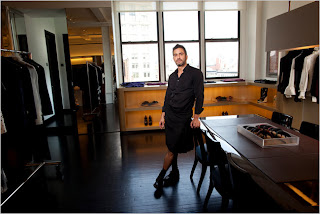Recently I chose to continue my research by reading 3 different articles. The first was titled Social Identity and the Meaning of Fashion Brands by Susan Auty and Richard Elliot. The second was The Survivor by Ruth La Ferla. And finally I read You’re a what? Image Consultant by Elka Jones. The first article furthered my knowledge of how fashion works while the other two gave me a better idea of what a life would be like in the industry and as a fashion stylist.
The article Social Identity was written by two university professors for a scholarly journal so I found myself struggling a bit with the terminology. None the less, I was completely intrigued in what it had to say. The article outlines a study considering the importance of social identity in the interpretation of brands of jeans measured by Snyder’s Revised Self-Monitoring Scale, which distinguishes between people who are highly motivated to respond to social cues and those who remain ‘true to themselves’. The article begins by claiming that “diverse theorists have demonstrated the use of clothing as a code”, then quote a London Orinda , I have always been aware of the way clothing brands label people but had never thought about how much that might effect a fashion stylists decisions. I realized that when a photographer asks a stylist to style the models in a certain way, the style of clothing is not only important but the brand of that clothing as well. The study then goes on to talk about why clothing is primarily a means of communicating not personal identity, but social identity. I was extremely surprised by this claim because I had always believed that clothing was a way to personally identify yourself. However, when I thought more indepthly about it, I realized a business woman may ask for a personal stylist not because they want to show people who they really are, but because they want to identify with high ranking professionals. Finally the article concluded on how important it is for advertising and clothing manufacturers to identify what social status they want their clothing to be sold under. Often they models they choose for their advertisements and they way they style their clothes will attract people from different social categories and should therefore be mostly advertised in areas with similar social rankings. This was another point that I had never thought about but realized that it is something extremely important for stylist to think about when working for various clothing companies.
Because the research was done post-presentation, I wanted to make sure I focused some of it on the final question of my project; Is being a fashion stylist the right career choice for me? After discussing this with Mr. Poling he generously found me an article about the life of famed fashion designer Marc Jacobs in the New York Times. The articles main focus was to discuss whether Marc Jacobs career was in full swing or if it was falling flat. One of the biggest points made was about how necessary it was to stay ‘relevant’ in the industry, but without changing your personal style. This meant that one is criticized if they are not constantly staying on trend, but also criticized if they change too much and loose what they are known for. The same is true for fashion stylists who commonly become known (and hired) because of the certain stylistic approach they take to styling a client. However, one of the most important parts of a stylist job is knowing exactly what is trending right then, which proves a difficult balance to keep.
 |
| Marc Jacobs in his office |
My final piece of research was about the life of a fashion consultant, a job much like a fashion stylist but usually pertaining more to individual clients then companies and models. The consultant, Lori Johnson, talks about how much more there is to her job then just fashion knowledge. She discusses how important it is to be able to read and understand people and then adapt to their needs. Lori also says that “part of her job is to help make the experience less stressful and to provide encouragement”. Her comments made me realize how important ‘people skills’ are in the business even thought it is often not taught or emphasized when learning about styling. The final part of the article detailed about how Lori not only consults but also does makeup and styling work for photographers, speaks about image and attire at conventions, and even volunteers her services to homeless shelters. Being self-employed, it is necessary to also know how to do your own business related tasks such as managing finances, billing clients, and personal advertising. Many of these things I had never thought about, but quickly realized I am going to need to know so much more than just how to style.
Throughout my research I thought extensively about whether or not fashion styling is the right job for me. After reading Lori Johnson’s story I realized that I could definitely see myself living the same life she is but wondered whether I had the courage to throw myself into a career that didn’t always have the most promising income source. In the end, I believe that I really should purse what I love to do, which is styling, but also believe that I need to find a career that will guarantee a comfortable life in the way of a steady income. However, I have yet to find exactly what that will be.
Auty, Susan, and Richard Elliot. "Social Identity and the Meaning of Fashion Brands." European Advances in Consumer Research 3 (1998): 1-10. Association for Consumer Research. Web. 30 May 2011. http://www.acrwebsite.org/volumes/display.asp?id=11145.
Jones, Elka. "You're a what? Image Consultant." Bureau of Labor Statistics. U.S.
La Ferla, Ruth. "The Survivor." New York Times 2 June 2011 : n. pag. Print.
No comments:
Post a Comment